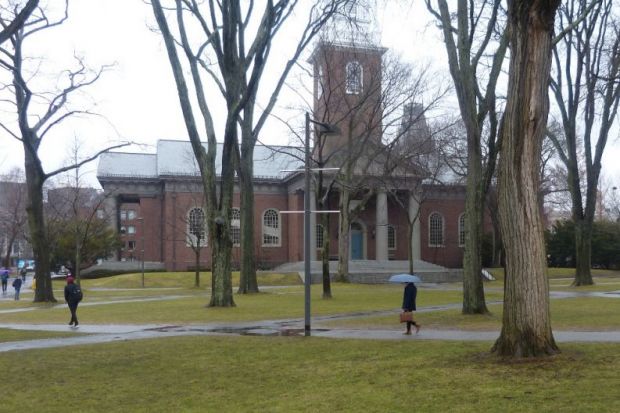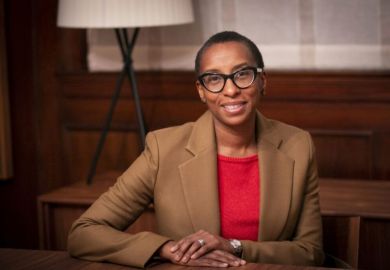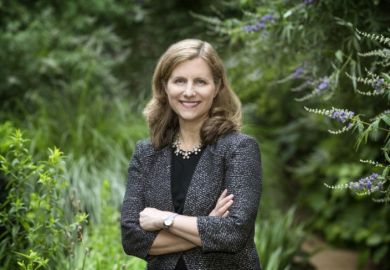As someone who has long tried to get universities to take academic misconduct seriously, you might imagine I’ve relished the media attention given to plagiarism accusations against Harvard University’s former president Claudine Gay. That conclusion would be a mistake.
There is a profound difference between promoting, through investigations, a culture of academic integrity where those violating norms are not given undeserved advantages and wielding allegations to engage in personal attacks with the aim of achieving other objectives. Gay’s departure must be seen in the context of a concerted politically motivated effort to remove her – one that gained momentum after Elise Stefanik’s belligerent and grandstanding interrogation of the Harvard president and other university leaders at a congressional hearing in December 2023.
Allegations of plagiarism, launched in the media and pursued through a complaint to Harvard, were seized upon by those who wished to attack Gay. A combination of misogyny, racism and political animus was at play. She was a proxy target for those opposing the academy in general, elite institutions in particular, and the promotion of racial and ethnic diversity in society. Even now that she has resigned as president there are still calls for her to be fired from her faculty position.
Those pushing for punishment of Gay assert she is not being held to the same standard as Harvard students because she is (a) female, (b) African-American and/or (c) powerful. To evaluate these claims, two questions need to be answered. What was the extent of Gay’s culpability and was the benchmark for her being subjected to discipline unfairly elevated for her?
Having examined the accusations, I conclude that in at least one case in her thesis dissertation, she clearly committed plagiarism. Most of the examples that were advanced as evidence, however, were not significant and included a few instances where she was presenting what, for lack of quotation marks or indentation, appeared to be a summary of a cited source but was actually a nearly verbatim quotation. Certainly an unacceptable practice, but on the scale of plagiarism infractions rather a minimal offence.
In general, therefore, the extent of violation of academic standards was not very high. Harvard, focusing on her later publications, found that she did not commit research misconduct, although that did not mean that they exonerated her from having plagiarised in her writings, per se.
The other issue is whether others, including students or other faculty, having infringed the same rules, would have been penalised more severely. The answer, overwhelmingly, is “no”.
Having identified and reported many specimens of plagiarism over the years, I can assure you that the consequences for much more egregious malfeasance is likely to be negligible. Students at US institutions who have plagiarised extensively in their theses are particularly allowed to escape scot-free. This outcome is a consequence of the mistaken belief that the Family Educational Rights and Privacy Act somehow prevents the disclosure by an educational institution about the results of investigations into misconduct in thesis dissertations. Inaction is the de facto approach. In conclusion, Gay did not receive any exceptional favourable treatment.
The weaponisation of plagiarism charges did not stop with Claudine Gay. One of her most visible detractors who promulgated the accusations was hedge fund manager Bill Ackman. Clearly in reaction to his efforts, an investigation into the writings of his wife, materials designer and former Massachusetts Institute of Technology (MIT) professor Nori Oxman, was conducted. Numerous examples of copying of passages from other authors with and without any citation were initially found by Business Insider. Subsequently Oxman was found to have cribbed repeatedly from Wikipedia in her doctoral dissertation. A 2011 article by Oxman had substantial textual overlap with an uncited 2005 book. She also engaged in text recycling between her articles.
If one were to compare the plagiarism infractions of Gay and Oxman, those of the latter are far more serious. Yet the assault on the scholarship of Oxman was once again less about ensuring academic integrity and more about scoring points – in this case against Ackman, a vocal political activist.
Swift retaliation followed in the form of a threat by Ackman to investigate all the works of MIT professors, its president and governing board members as well as those of reporters at Business Insider for plagiarism. In addition, underlining how such attacks seem to find their targets in diversity research and its African American proponents, Harvard’s chief diversity and inclusion officer Sherri Charleston was also targeted for a plagiarism hunt. The accusations in the complaint that was sent to Harvard (published on the Washington Free Beacon website) are mostly examples of appropriate paraphrasing with proper citation with a few short quotations that should have been identified as such.
A large number of the allegations relate to a 2014 article that Sherri Charleston coauthored with her husband, LaVar Charleston, and another individual. There is, indeed, substantial overlap with a 2012 study of which LaVar Charleston is sole author, an example of the unacceptable practice of duplicate publication. However, it would appear that the charges against Sherri Charleston are not being made and publicised in good faith. First, the latter example is not plagiarism. Second, the complaint deceptively lists Sherri Charleston as the first author, leading to the implication that she is taking credit for her husband’s work. In fact, LaVar Charleston is the first author of the 2014 article meaning that the responsibility for the duplicate publication is primarily his. There is no possibility for an outsider to evaluate the contribution of Sherri Charleston to the article, but to attribute the duplication to her is dishonest.
Although there is little that is salutary in this whole affair, there are some lessons. First, far too many people do not actually understand what plagiarism is. Although, there are subtle disagreements and field-specific variation in standards and disputes about the relative seriousness of violations, there is widespread agreement about what constitutes plagiarism. It should not be conflated with other infractions of academic norms, which often occurs in media coverage of these issues.
Second, one should be quite careful about engaging in proper citation practices from the earliest times in one’s academic endeavours – failures may haunt you. Do not copy text into an article that you are writing. If you want to refer to a quotation, place it in a separate repository document (including an appropriate full citation) and only incorporate it once you have put quotation marks or indentation in place. If you are paraphrasing, be certain to cite your source. Don’t give those who wish to spread distrust in scholarship any assistance.
Third, copying from Wikipedia is completely unacceptable and a display of egregious laziness. Furthermore, it is almost always not a citable source (unless one is writing about Wikipedia itself) for several reasons. I recall that when I was in elementary school a foresightful teacher forbade us getting our information from the World Book Encyclopedia, the Wikipedia of its day. It’s not that the information in Wikipedia is particularly inaccurate. It’s merely that it is the contribution of anonymous authors concerning something that may or may not have an origin in an identifiable document. Wikipedia is a valuable resource but not a source. It should only be used as a starting point for arriving at a primary report, which should be the one cited.
Fourth, it is clear that the media plays an important role in amplifying and sometimes uncovering academic misconduct. In one case of image duplication/plagiarism that I investigated, an article in The New York Times was critical in ensuring that journals and institutions took appropriate action with regard to a prominent laboratory containing repeat offenders.
I often remark that in the US, the purpose of the protections of freedom of the press provided by the First Amendment to the United States Constitution is to hold the powerful accountable. But it is an abuse of that freedom when the media misrepresents academic conduct. The number of allegations being made is inconsequential unless they are valid; they have to be evaluated on an individual basis. Certainly, if there is a pattern of misbehaviour then the offence is worse, but the smoke of multiplied calumny does not indicate the fire of misconduct.
Finally, the exchange of volleys of plagiarism charges ultimately has one ultimate goal: the denigration of academia. There are those of us who, as part of our professional endeavours, investigate violations of publication standards, because they are interested in ensuring that the products of research are reliable and that there is a level playing field for those who adhere to rules. We believe in the value of the communication of intellectual achievement and strive to enhance trust in it by safeguarding its validity.
There are others, however, who are solely interested in hurling accusations in order to demean their opponents. In my own experience, I have observed attempts by authors and complaisant journal editors to initiate investigations into individuals who brought forth allegations of image manipulation or plagiarism. Sometimes these efforts include paying people to conduct the analysis and intimidation against editors who wish to take action about the original substantiated charges.
A verified claim of serious misconduct should be accepted no matter its source, but it is essential to consider the motivations of those who multiply frivolous assertions of misbehaviour. We should not allow the momentous enterprise of knowledge generation to be undermined by hostile forces.
David Sanders is associate professor of biological sciences at Purdue University.
Register to continue
Why register?
- Registration is free and only takes a moment
- Once registered, you can read 3 articles a month
- Sign up for our newsletter
Subscribe
Or subscribe for unlimited access to:
- Unlimited access to news, views, insights & reviews
- Digital editions
- Digital access to THE’s university and college rankings analysis
Already registered or a current subscriber? Login







